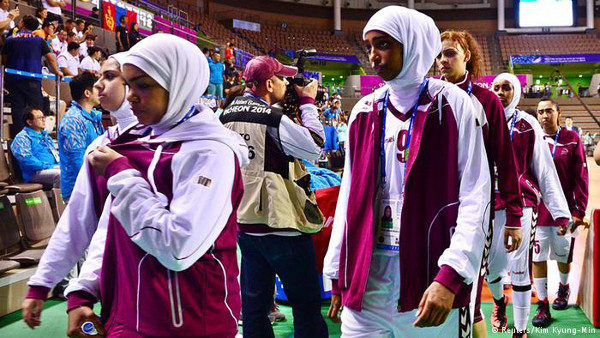

By: abc.net.au
Source: http://www.abc.net.au/
The Qatar women’s basketball team has forfeited a match at the Asian Games on Wednesday after being refused permission to wear the hijab.
The players were asked, in accordance with International Basketball Federation (FIBA) rules, to remove their Islamic headscarves in order to play against Mongolia.
The players refused, saying it violated their religious beliefs and they wanted to send a strong message to the sport’s governing federation that the ban was unfair.
“We have to take this stand,” said Ahlam Salem M Al-Mana of Qatar.
“We are here to push the international association that all Muslim teams are ready to compete in any competition.
“We knew about the hijab ban, but we have to be here. We have to show everyone that we are ready to play, but the International Association is not ready.”
A spokesperson for the Incheon Asian Games said that organizers had no alternative other than to declare a forfeit.
“The rule that the players broke is International Basketball Federation rule 4.4.2, which talks about uniforms and what players can wear,” the spokesperson said.
“The technical official asked them to remove the scarf and they refused, so the game was forfeited by Qatar.”
Qatari player Amal Mohamed A Mohamed said they had been assured they would be able to wear the hijab before they came to the Games, which are being run under the slogan “Diversity Shines Here”.
“Since we can’t take that off to take part in the match because of our religion, we just forfeited the match with Mongolia,” she said.
Ms Mohamed said she was confused about why the scarf had been banned.
“We’ve attended many international competitions in Indonesia and China. Therefore, we will not attend any games in this Asian Games unless the officials change their decision,” she said.
Other sports at the Asian Games allow athletes to wear the hijab, with all four members of the Iranian lightweight women’s quadruple sculls team wearing hijabs as they rowed to a bronze medal on Wednesday.
Earlier this year, the International Football Association Board unanimously overturned a ban on the garments, allowing soccer players to wear them.
Basketball remains one of the exceptions, though FIBA said earlier this month it had held discussions on the issue and was introducing a two-year ‘testing phase’ on what players can wear.



